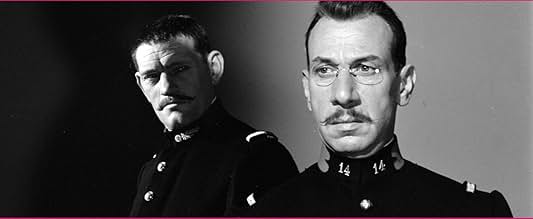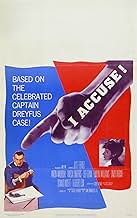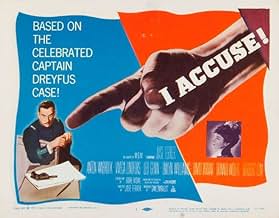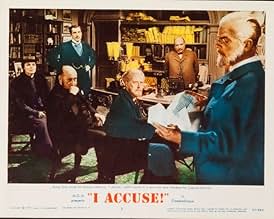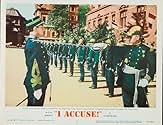VALUTAZIONE IMDb
7,2/10
791
LA TUA VALUTAZIONE
Aggiungi una trama nella tua linguaIn 1894 France, a Jewish officer in the French Army is falsely accused of spying for Germany.In 1894 France, a Jewish officer in the French Army is falsely accused of spying for Germany.In 1894 France, a Jewish officer in the French Army is falsely accused of spying for Germany.
José Ferrer
- Captain Dreyfus
- (as Jose Ferrer)
Recensioni in evidenza
The most interesting characteristic of this film is its almost militarily disciplined restraint. It is all about the glory and honour of the military, and most of the actors are military officers. José Ferrer has directed this film focusing on military mentality and managing very well in bringing forth both the good sides of it and the worst, the unreasonableness of disciplinary rigour. The film is crowded with outstanding actors, like David Farrar as the brother, Felix Aylmer as the old lawyer, Herbert Lom as the relentless calligraphic expert, Anton Walbrook as a very suave and clever Esterhazy, and above all, the beautiful Viveca Lindfors as the wife. I had been searching for this film for years when it suddenly appeared on my menu, and although my expectations were the very highest, I was positively surprised. The best actor of all here is José Ferrer himself as the culprit, and although Captain Dreyfus has been brought on film many times, this must be the best interpretation of the character. The scenes of his trials on Devil's Island are heartbreaking without going to extremes, also here the director sticks to his very objective discipline. It is a most admirable treasure of a film, priceless and precious, while Emile Zola is a little played down. Well, he had his own film in 1938 with Paul Muni, in which film Dreyfus almost stole the entire show, so even Emile Zola has to conform here to the strict discipline of the impressingly military discipline of this extremely important film.
The issues raised by the terrible injustice inflicted upon Captain Alfred Dreyfus and Emile Zola's subsequent rallying cry 'J'accuse' in 'L'Aurore' of 1898 are timeless and have certainly struck a chord with film-makers, enabling many of them to draw parallels with their own times and experiences.
The final speech by Paul Muni as Zola in William Dieterle's excellent biopic is a veiled reference to the rise of Nazism although strangely, considering that Dreyfus was Jewish, no one utters the words 'Jew' or 'anti-Semitic'. Fast forward eighty odd years and we have a version by Roman Polanski for whom the Jewish element would have provided many painful memories. There are those who have seen in his film an allegory of the director's own perceived persecution by LA County! Yves Boisset's TV film reflects his cinematic crusade to depict institutionalised corruption whilst the Ken Russell/Richard Dreyfus version is just one too many. Mr. Dreyfus is advertising his liberal credentials here and claims to be a descendant of the unfortunate Captain. The fascination of the eleven minute series by Georges Melies stems from its being made whilst the Dreyfus affair was still raging. I have alas never seen Richard Oswald's version and would be interested to see how the Germans handled the subject.
This adaptation from 1958 is directed by and stars well-known liberal José Ferrer, is produced by Sam Zimbalist and has a screenplay by Gore Vidal. Hardly surprising therefore that there are distinct echoes here of the McCarthy witch hunts.
It is made in a very matter-of-fact manner and some of the leading characters are under-written but the emotive material and strong performances carry us through.
A contingent of dependable British thespians is on dispay here notably Leo Genn whose genteel persona suits perfectly the character of Major Picquart who campaigned tirelessly for Dreyfus' acquittal whilst the odious General Mercier of Donald Wolfit epitomises Oscar Wilde's observation that "patriotism is the virtue of the vicious." Equally obnoxious is Major du Paty played by the superlative Herbert Lom, sans peruke. The two performances that linger longest are those of Swedish born Viveca Lindfors who brings her customary intelligence and sensitivity to the role of Madame Dreyfus and the immaculate Austrian Anton Walbrook who effortlessly steals all of his scenes as the charming but despicable Major Esterhazy.
José Ferrer achieves the Herculean task of being both director and portraying Dreyfus. A previous reviewer, female naturally, has remarked upon Mr. Ferrer's lack of charisma and sex appeal. I was not aware that Dreyfus possessed either of those attributes or that Mr. Ferrer was ever called upon to play a role that required them. He is immensely sympathetic in the part and what he does possess is that golden voice.
The film proudly announces that Dreyfus' eventual acquittal and reinstatement represent a brave chapter in French history. This is of course absolute tosh for were it not for the bravery and determination of a few individuals, Dreyfus would have been left to rot on Devil's Island.
The final speech by Paul Muni as Zola in William Dieterle's excellent biopic is a veiled reference to the rise of Nazism although strangely, considering that Dreyfus was Jewish, no one utters the words 'Jew' or 'anti-Semitic'. Fast forward eighty odd years and we have a version by Roman Polanski for whom the Jewish element would have provided many painful memories. There are those who have seen in his film an allegory of the director's own perceived persecution by LA County! Yves Boisset's TV film reflects his cinematic crusade to depict institutionalised corruption whilst the Ken Russell/Richard Dreyfus version is just one too many. Mr. Dreyfus is advertising his liberal credentials here and claims to be a descendant of the unfortunate Captain. The fascination of the eleven minute series by Georges Melies stems from its being made whilst the Dreyfus affair was still raging. I have alas never seen Richard Oswald's version and would be interested to see how the Germans handled the subject.
This adaptation from 1958 is directed by and stars well-known liberal José Ferrer, is produced by Sam Zimbalist and has a screenplay by Gore Vidal. Hardly surprising therefore that there are distinct echoes here of the McCarthy witch hunts.
It is made in a very matter-of-fact manner and some of the leading characters are under-written but the emotive material and strong performances carry us through.
A contingent of dependable British thespians is on dispay here notably Leo Genn whose genteel persona suits perfectly the character of Major Picquart who campaigned tirelessly for Dreyfus' acquittal whilst the odious General Mercier of Donald Wolfit epitomises Oscar Wilde's observation that "patriotism is the virtue of the vicious." Equally obnoxious is Major du Paty played by the superlative Herbert Lom, sans peruke. The two performances that linger longest are those of Swedish born Viveca Lindfors who brings her customary intelligence and sensitivity to the role of Madame Dreyfus and the immaculate Austrian Anton Walbrook who effortlessly steals all of his scenes as the charming but despicable Major Esterhazy.
José Ferrer achieves the Herculean task of being both director and portraying Dreyfus. A previous reviewer, female naturally, has remarked upon Mr. Ferrer's lack of charisma and sex appeal. I was not aware that Dreyfus possessed either of those attributes or that Mr. Ferrer was ever called upon to play a role that required them. He is immensely sympathetic in the part and what he does possess is that golden voice.
The film proudly announces that Dreyfus' eventual acquittal and reinstatement represent a brave chapter in French history. This is of course absolute tosh for were it not for the bravery and determination of a few individuals, Dreyfus would have been left to rot on Devil's Island.
A most excellent portrayal of men, politics and truth and how truth is given a back set to the affairs of men. This story is as old as mankind itself. To see someone unjustly and falsely accused of a crime and not be able to do anything about it summons the deepest feelings one can have for life itself and of course the life giver. This story comes to you at a price...the price of a mans life. You see its true he suffered and then continued to suffer in a place made for suffering exclusively i.e. Devils Island prison. The french were notorious for punishment and being a french traitor made you especially un-welcomed on the island. Man is not perfect as we learned in Victors Hugo accounting called Les Miserable. That is why here in America, we would rather see 12 guilty people go free before we convict or condemn an innocent person. This movie drives home that point. Don't fight the emotional scenes when they come. There are a few and they can clean you out if you let them..
10dobbs-12
This is a true story of the Alfred Dreyfus indictment and imprisonment of an innocent man who loved his country. Dreyfus was a Jew in the French army and that is probably the main reason he was persecuted and found guilty of treason. The man was innocent but sent to Devil's Island anyway. He finally was released and his honor restored. His living relative (actor Richard Dreyfus) made a film of this tragedy and it is without a doubt one of the best films I've watched lately. Be sure to watch them both because this is history.
Great story for then and now about politics and false accusation. Acting was great. Movies from 30's 40's and some 50's are of great quality. Well written and filmed. You will enjoy. Reminds me of Les Misérables. But seems more real like in the story.
Lo sapevi?
- QuizThis movie was not shot in widescreen. It was converted to CinemaScope in the final print after having been shot in standard Academy ratio, much like some movies, which are "matted" after having been shot in Academy ratio. The process used was contemporary of SuperScope and a forerunner of Super 35. It was filmed using spherical lenses at an aspect ratio of 1.37:1. In the printing process, the images were cropped to a height of two perforations, giving them an aspect ratio of 2.36:1. The images were then stretched vertically to a height of four perforations, at which point they conformed to the standard CinemaScope-2 format.
- Citazioni
Émile Zola: This Esterhazy is one of the most glorious liars that ever drew breath. Why, the authority of it, the poise; the man's a genius!
- Curiosità sui crediti[Scrolling Prologue] In 1894 Alfred Dreyfus, a French Army officer, stood before a military tribunal accused of treason. The outcome of this trial, a trial that created an international sensation, is a brave chapter in the history of France, that nation which first proclaimed the Rights of Man.
I più visti
Accedi per valutare e creare un elenco di titoli salvati per ottenere consigli personalizzati
- How long is I Accuse!?Powered by Alexa
Dettagli
Botteghino
- Budget
- 1.800.000 USD (previsto)
- Tempo di esecuzione1 ora 39 minuti
- Colore
- Mix di suoni
- Proporzioni
- 2.35 : 1
Contribuisci a questa pagina
Suggerisci una modifica o aggiungi i contenuti mancanti


